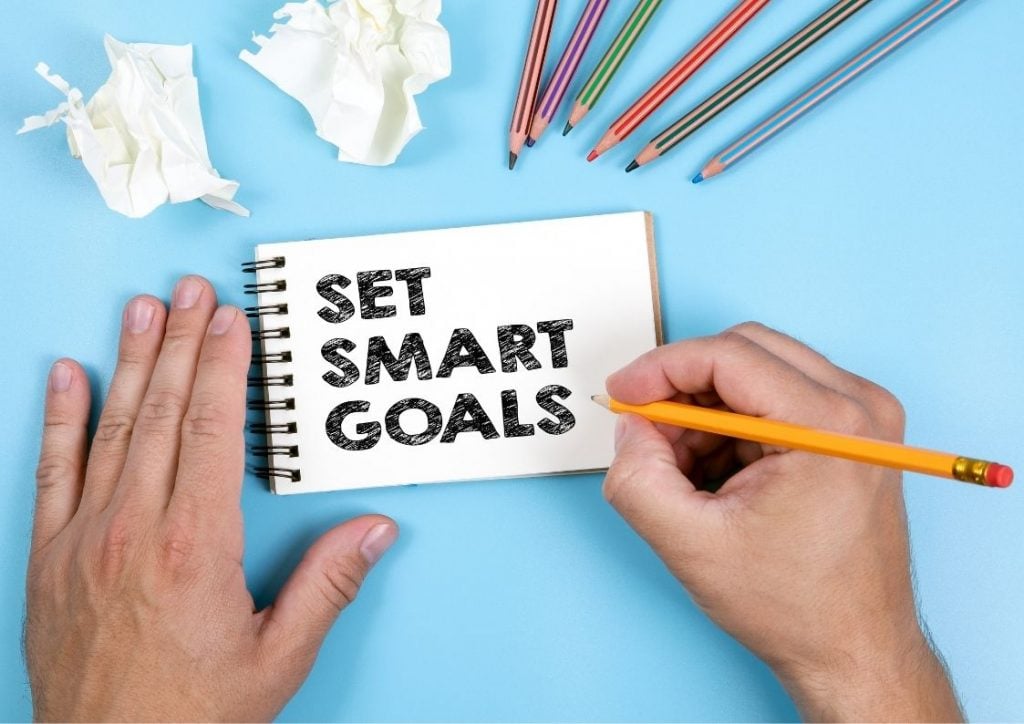Goal setting. It’s one of those tasks that’s easy to procrastinate on: it can be difficult to really confront what you want out of life. But, if you can summon the courage to sit down and get thinking, then goal settting can build your study motivation – and even be fun!
So keep reading to find out why goal setting is important for students, and for seven top tips that will have you setting effective study goals AND enjoying it in no time.
By Dr Kerri-Anne Edinburgh, our Cambridge University educated specialist in study skills, mindset, research and writing. As Head Writer and Editor for the popular Exam Study Expert blog since 2021, Kerri has spent over three years immersed in the psychology of learning, ensuring each article is packed with valuable insights, practical tips and helpful graphics.
Article review by William Wadsworth
Why should you set study goals?
Let’s start with the most important reason:
Setting goals is fundamental to long-term success – you can’t get to your destination if you haven’t clearly defined what it is!
So what do you want to achieve?
An A in English? Full marks on your next assignment? A place at your first choice university?
Having the right goals means that you know why you’re doing this, why you’re getting down and studying hard.
And as finding your “why” is all about that ideal combination of goals and motivation, this means that:
As a student, setting the right short- AND long-term goals is the perfect way to boost your motivation to study.
In fact, goals are a pretty vital tool that I like to call a motivational ‘kite’: they will lift you up and get you flying towards academic success!
Your goals need to pull you forward and not hold you back. They provide focus and direction, and a clear map. That means that your goals can provide the energy to carry on even when your motivation is low.
What’s more, practising regular goal setting will help you develop a whole range of useful skills:
- Time management
- Planning and organization
- Self-awareness
- Accountability for your actions
- Growth mindset
- Dealing with obstacles
Goal setting is also great for triggering new behaviours (like study habits and routines), and the feelings of success and confidence that come from achieving them often lead to greater productivity.
So what’s not to love about a tool that is guaranteed to increase your motivation, give you purpose and boost your self-confidence?
Here’s how to get goal-setting the right way as a student:
Setting the right goals: 7 top tips
The right goal can do wonders for you. It will make you:
- Feel inspired: if you really want it, you’ll believe in yourself
- Lose the fear: studying won’t feel as daunting
- Try harder: you’ll find your inner grit!
- Persevere for longer: you won’t give up on that hard problem – phew!
- Be more efficient: you’ll procrastinate less and keep a sharp focus on the tasks that will deliver the results you need – like grade improvements!
Think of goal setting as a way to organise a collection of meaningful achievements.
You can – and should – set goals for today, tomorrow, this week, this month, this year – even as far ahead as graduation (although make sure you revisit and revise them)!
1. Get smart about your goals
If you’re feeling fired up to set some goals, that’s great news.
But you need to do it in a smart way, because vague expectations only nurture your reluctance to work.

SMART goals have been the most well-known goal-setting technique in psychology and teaching for the past couple of decades.
The acronym is simple to remember – your goals need to be:
- Specific: clear and specific, not generic – what do you want to happen, and what is your action plan?
- Measurable: how will you know you’ve achieved your goal?
- Achievable: is it possible to reach this goal with hard work by your deadline?
- Realistic and relevant: is this goal important to YOU?
- Time-bound: what is your deadline? Make it specific!
Making your goals specific and achievable is the key to making them successful, every time!
Want to make your goals even smart-ER?
As a student, goal setting is a process that you need to continually revisit, so remember to take the time to regularly:
- Evaulate your progress, and
- Review, reflect and adjust your approach to make sure you can still achieve your milestones!
Using this technique creates short-term goals that are achievable, and totally within your control. Here’s how:
Instead of:
I’m going to learn 100 words of French today
I’m going to finish my literature review for my dissertation
Try this:
I’m going to learn French for 2 hours today
I’m going to choose 10 key papers and read them by Friday afternoon
Feels less daunting, doesn’t it?
2. Setting effective long-term goals as a student
When setting a long-term goal as a student, you need to consider the final outcome. Where do you want to be next semester, next year?
Take into account these three factors:
- Your track record: aim to MEET or BEAT your current grades in your final assessment.
- Your history of effort: have you put the work in so far? Can you step it up a gear or two – and work harder and smarter to improve your grades?
If you don’t know how to boost your effort or efficiency, I am here to help: with a free introductory 1-on-1 consultation and tailored academic coaching just for YOU.
- Your temperament: are you typically over-confident? Or prone to anxiety and distress?
Choose a goal that is manageable and achievable, one that won’t make you too stressed. The sweet spot to bring out your best is often just on the edge of what feels comfortable!
Already have a B in Geography? Aim for an A next semester.
Need 3 A’s to get into your top university choice? Those grades are your long-term goal.
If you’re ready to set some long-term life goals that’s great news, because you’re working towards your reasons “why” – why you study and what you’re striving towards.
3. Have you got a great Plan B?
Big picture thinking can get a little scary.
So, if you’re feeling stressed out and overwhelmed by a single-minded long-term goal, add in a Plan B.
Having a viable destination in mind will take the pressure off – and in some cases can make it more likely that you achieve your “shoot for the moon’” Plan A, because you’ll be less anxious and burned out!
Ask yourself: what’s my plan B?
Put some mental effort and research time into finding reasons to be excited about your plan B! Trust me, it’s worth it.
For example: Do you want to study medicine at Oxford University as your Plan A? Find out about three other great programmes that are viable alternatives. What do they offer that is unique?
4. Smash those milestone into inch-pebbles!

Sometimes a goal or project just seems insurmountable. Especially those big long-term goals.
And that’s an easy path to procrastination!
So get ahead of procrastination and stay on track by breaking down your goals into milestones.
Want that A in Geography but no idea how to get it? Break it down into milestones made from chapters to revise and mock exams to take.
Write yourself out a map filled with those milestone markers. And check them off when you reach them!
And if you’re still procrastinating on all the tasks needed to achieve that milestone, break it down further into a tiny inch-pebble.
Tiny goals give you the momentum to get started, do more AND carry on.
Read one paper abstract. Write two sentences in the next 30 minutes. Come up with your headings structure.
And then keep going onto the next inch-pebble goal – before you know it you’ll be at that milestone marker!
5. Make it manageable, every day
Setting short term goals is just as important as a student as thinking about the big-picture ones. These are the milestones and inch-pebbles that will get you to your destination
Short-term goals are often process goals.
A process goal focuses on the journey you’re going to take – in contrast with outcome goals, which are all about the destination.
Here’s an example:
- Process goal: I’m going to work on this article for 2 hours before dinner
- Outcome goal: I’m going to write 5,000 words by Friday
Process goals are great because they’re within your control, and they make tracking progress part of your everyday study routine.
Over the last couple of years, I’ve found a strategy that works (for me). Every morning I write down the top three things I want to achieve for the day: my daily goals.
One of them is often “practise yoga at 6pm with Alice”. Another might be work-related: “spend 3 hours editing the article draft” (a process goal). And the third – well that depends on how much I feel I can get done that day.
The key is to make your daily goals achievable.
Because that builds up and soon you’ve got milestones checked off left, right and centre!
6. Indulge in playing the “yet” game
Sure, you want to stretch yourself as a student when setting a daily (or even monthly) goal, but there’s no point in being totally unrealistic.
Piling too much work on your study plate is a sure-fire way to drag your productivity and motivation down.
Play the ‘YET’ game – never say you can’t do something, only that you can’t do it ‘yet’ – it’s the cornerstone of growth mindset.
Don’t just say “I can’t win this debate”, say “I might not win this debate, but if I practice – I’m going to win the next one!”
If you miss your achievable goals for three days in a row, then they’re not achievable – YET.
Make them smaller, because you can build back up as your stamina grows!
A great way to manage this is by setting upper and lower limits so you can learn what is realistic for you!
So take a moment now, and reflect on what your goal is. Do you have a decent chance of pulling it off?
If not today, what can you do to make it happen, say, in a month?
The most effective goals are a challenge. They stretch you to improve and accomplish more. Playing the “yet” game will help them feel less daunting!
7. Write it down

Goal setting works best (for everyone, not just students!) when it’s tangible, because that piece of paper is what will keep you accountable.
Have you got a goal figured out?
If so, fetch a pen and paper and write it down, NOW. Go ahead and make a chart full of milestones and inch-pebble tasks.
This is a great way to make it REAL, and hold yourself accountable for your actions.
Then RUN towards it – I know you can!
Now go ahead and make it fun!
It’s time to talk rewards.
Because celebrating achieving your goals – and every progress milestone along the way – is an important part of making them work for you!
So go ahead, give yourself a gold star – yes, really!
Tracking and celebrating your progress towards your study goals is a great way to feed yet more motivation.
Exam Study Expert’s founder William is over 30 years old and still has a gold star chart on the wall to track the weekly actions and long-term milestones for growing the company. He often says it makes him feel great about working towards his goals for the business.
This stuff is simple but it really works.
Once you’ve got your own star chart gleaming on the wall (and “make star chart” ticked off), make some plans for meaningful rewards. What do you REALLY want to do?
When you nail that nerve-wracking presentation in class, take the evening off and play that new game you’ve been wanting.
Or when you get that A on your Biology exam, head out for a celebratory day at the theme park with friends!
And when you get your university acceptance letter, splash out for a fancy dinner with your parents.
Make celebrating yourself and your achievements a habit.
Summary
So that’s it – you’re ready for setting some killer study goals and becoming a motivated student!
Remember to:
- keep them specific and achievable (right on that challenging sweet spot)
- make both long-term and short-term goals
- use outcome AND process goals
- keep track of all your progress
… and your effective study goals will have you motivated and marching towards great grades in no time at all.
Why not share what your No.1 study goal is this year, in the comment section below?
Good luck!

By Dr Kerri-Anne Edinburgh, our Cambridge University educated specialist in study skills, mindset, research and writing. As Head Writer and Editor for the popular Exam Study Expert blog since 2021, Kerri has spent over three years immersed in the psychology of learning, ensuring each article is packed with valuable insights, practical tips and helpful graphics.
Author Profile | About Us | Editorial Policy | Contact Us



This is the most comprehensive article I have seen on setting goals for student. Thanks for sharing this.